Newsnight Gold: Lean's Passage to India - 1
Mark Tully speaks to David Lean and his cast during the production of 'A Passage to India' in 1984.
This year, 2008, is Sir David Lean's centenary year. To commemorate the great director - born 25 March 1908 - the British Film Institute is running a David Lean season. Meanwhile, the BBC's Newsnight programme has re-issued Mark Tully's 1984 report from the set of Lean's film 'A Passage to India'. You can watch this 11 minute film online at the BBC website here. For the interest of all 'A Passage to India' fans, I have included a transcript and some screen-shots of the documentary. On the second page, Mark Tully's Location Report - 2, you can see more screen-shots from the documentary, with an emphasis on the locations used in the film.
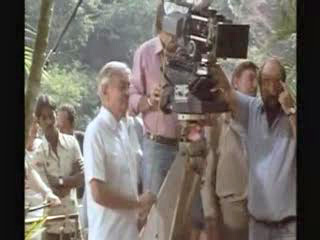
David Lean films in the Bangalore Club gardens
| [scene: In the gardens of the Club, Bangalore] | |
| Clapper Operator | And turnover... 639 take one and playback... |
| (The brass band plays 'Tea For Two') | |
| Mark Tully | The legend of the man who's risen from tea-boy to master movie-maker has raised 17 million dollars for this elaborate production. David Lean, back on location, 14 years after his last film, Ryan's Daughter. For 25 years he's wanted to make 'Passage To India'. |
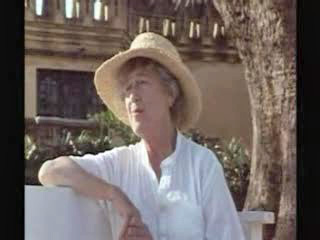
Peggy Ashcroft talks to Mark Tully
| [scene: In the gardens of the Club, Bangalore] | |
| Peggy Ashcroft | Like everyone else, I suppose, one marvels at his incredible energy, at his precision, at his knowing exactly what he wants with every shot. And he's obviously.. he's a movie maker isn't he, of considerable cut. |
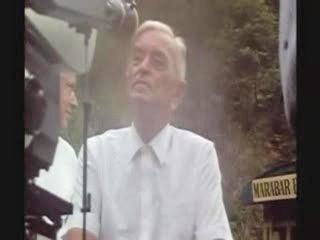
David Lean filming on the Nilgiri Mountain Railway
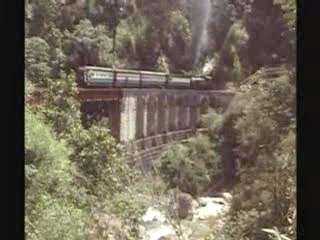
Filming on the Adderley Viaduct
| [scene: At the Adderley Viaduct, on the Nilgiri Mountain Railway] | |
| Mark Tully | Forster's train crawled across the dry, dreary plains of North India. Lean's climbs through the lush Nilgiri Hills 1000 miles to the south. Another of those spectacular locations he has a passion for. Forster's is the journey of a young English girl, who tries to defy the traditions of the British Raj, and see the 'real' India. Overwhelmed and confused by the splendour and squalor of this ancient land, Miss Quested scandalises the British and causes the Indians to riot. |
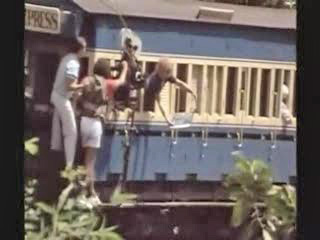
Filming as the train climbs over the Adderley Viaduct
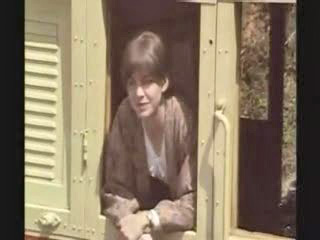
Judy Davis plays Adela Quested
| [scene: At the Adderley Viaduct, on the Nilgiri Mountain Railway] | |
| (Judy Davis looks from carriage window) | |
| Mark Tully | Judy Davis, a budding young film star, plays the questing Miss Quested |
| David Lean, in background | Lets start again. Keep it running. And dear, a little less... |
| Mark Tully | All the tricks of the film maker are used on her journey to the picnic at the caves, where perhaps, India itself tricks her. |
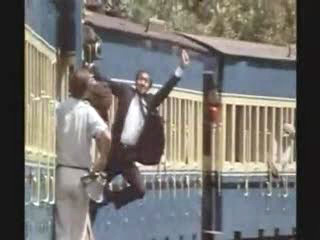
Filming Victor Bannerjee as he hangs from the train
| [scene: Filming at the Adderley Viaduct] | |
| Dr Aziz, to camera | Miss Quested |
| Miss Quested, to camera | Oh no |
| Dr Aziz, to camera | Is Mrs Moore awake? |
| Miss Quested, to camera | Yes |
| Mark Tully | Equally confused is Dr Aziz, the Indian who gets too close to the British Raj. He's played by Victor Bannerjee, so far unknown outside India. |
| Dr Aziz, to camera | Look, I'm Douglas Fairbanks |
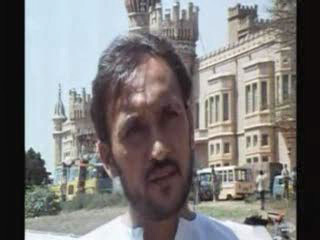
Interviewing Victor Bannerjee
| [scene: Interview at Bangalore] | |
| Mark Tully | Played without subtlety, Aziz could easily degenerate into a mere buffoon. |
| Victor Bannerjee | In the book, Aziz is certainly a joker, but I think David's dispensed with more than 90 percent of the clown in Aziz, and left only that much that is necessary to make him a sympathetic human being. |
| Mark Tully | At one stage, David felt that you weren't really being Indian enough, didn't he? Was he trying to force you into a sort of artificial 'Indian-ness'? |
| Victor | Absolutely, I think yes. I think, you see, Forster was one of the very few Englishmen that understood Indians, and it was this deep understanding of Indians that made him write a book that was able to delve into the psyche, the Indian psyche as it were, and I don't expect David, or any other director, or most Englishmen to be able to understand that. |
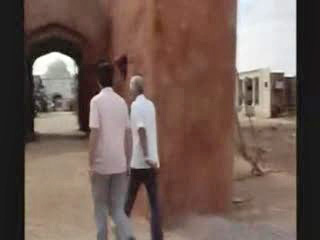
Tully and Lean on the Bazaar set in Bangalore
| [scene: Interviewing David Lean on set at Bangalore] | |
| Mark Tully | Leans believes he'll be the first film maker to capture India. This is his own India - sets massive but at the same time immaculately detailed. Forster mistrusted movie makers. The film rights were only sold after his death. Lean then spent 18 months writing his script and had to be vetted by the guardians of Forster's masterpiece, the Fellows of Kings College, Cambridge. |
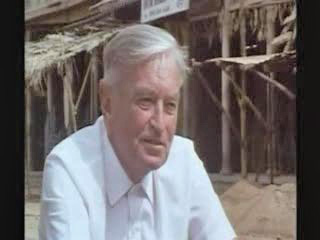
David Lean talks about his movie 'A Passage To India'
| [scene: Interviewing David Lean on set at Bangalore] | |
| David Lean | I did the script, and they were very polite, and they asked me to come along, after having read it, for lunch. I was just about to start on the fish, and they started in on me, and I said I wish you'd waited until the sweet! They were very very nice indeed, and after about 2 hours they were very kind and just gave it their blessing. |
| Mark Tully | How much difference is there between Lean's 'Passage To India' and Forster's 'Passage To India'? |
| David Lean | He's a writer, I'm a film maker. I like movies, and I've tried to make a movie that I would like to see. The end is different, certainly, but I think I wouldn't be ashamed for Forster to read the script. I think I stuck with his characters, and on the whole, given the limitations of time, I mean what's one doing? One's doing something in 2 hours, a book that thick, its a sort of sketch of it, and I'm extracting a movie from it. Those who want to read Forster, read the book. Those who want to go to a movie, and don't read, come and see our film. |
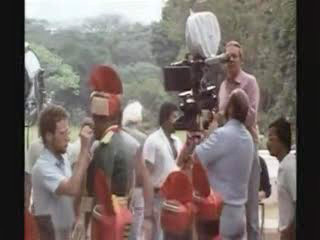
Filming in the grounds of the Bangalore Club
| [scene: Filming the band, at the Club, Bangalore] | |
| Mark Tully | Band-master Pereira was good enough for the Maharajah of Mysore, but not for Lean. A substitute was found. But in the end, even the perfectionist director couldn't resist Pereira's tearful pleas. So now he's back, conducting at the garden party the British throw for the Indians. The film's backers are worried that the current British Raj bonanza will go bust before 'Passage To India' is released. Forster's concern was more academic - he feared film-makers would portray the Indians as idiots, or the British as Blimps, that the balance of his story would be lost. |
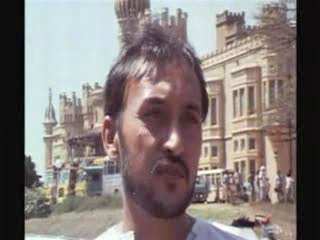
Interviewing Victor Bannerjee in Bangalore
| [scene: Interviewing Victor Bannerjee at Bangalore] | |
| Victor Bannerjee | I think the fear was well founded, I don't think any film maker would be able to achieve the kind of balance that Forster felt so deeply about. If Satyajit Ray had made the film, as he once wanted to, I think he'd have had unintentionally, a sub-conscious sort of Indian bias, just like David, in spite of the fact that he does love India, and has close Indian connections, can't really maintain a perfect balance, so there is a slight tilt, obviously. |
| Mark Tully | In the direction of ? |
| Victor Bannerjee | In the direction of the English! |
| [scene: Interviewing David Lean at Bangalore] | |
| David Lean | Poor old English - they've had a rough time in the films lately, and its because, of course, colonialism has gone out of fashion so its quite easy to take pot shots of a lot of idiots, a lot of idiots, stuffy idiots you know. |
| Mark Tully | Yes |
| David Lean | Quite honestly I think Forster did that too. I think he felt a bit guilty about it - I mean he certainly had a blast when the book came out, and I'm trying to keep a balance, I don't know. I'm trying to tell a good story, that's really what I'm trying to do. |
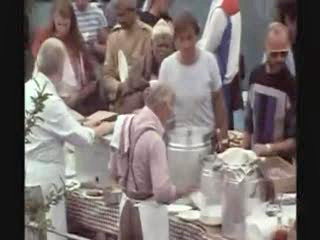
Serving food to the cast and crew
| [scene: With the crew, on location] | |
| Mark Tully | Helping to tell the story is an army from England. They even imported much of their own food, including kippers for breakfast. But meals aren't the production's only administrative problem. Perhaps the worst is India's notorious red-tape. |
| [scene: Interviewing David Lean at Bangalore] | |
| David Lean | I took my first baptism of fire, was going through the customs, you know it takes about two and a half hours to get through the customs. 'Have you got any apparatus?' as you no doubt know with that thing [Mark Tully's recorder]. They look at every lens. 'Are you going to sell this? How much film have you got? Are you going to sell it?'. No, I wouldn't have bought it to sell it, and so forth and so on, and after 2 hours one hates the country. And then, of course, its wonderful. |
| Mark Tully | You have certain problems still with the government for instance, don't you, that you still have to have someone here checking that you're shooting according to the script. Does that annoy you? |
| David Lean | They've been very good to me. |
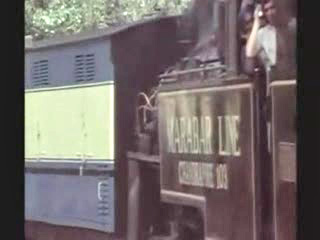
Closeup of the Marabar Express
| [scene: On location near Ooty] | |
| Mark Tully | Indians have been so kind they've even allowed the production to monopolise the branch line from Coonoor to Ooty. At 75, Lean is as demanding as ever, taking and re-taking scenes until he gets what he wants. |
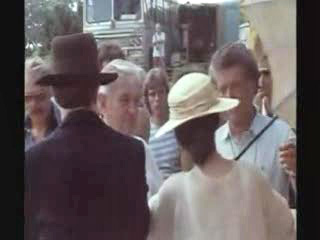
David Lean on set in Ooty
| [scene: On location at Ooty] | |
| David Lean,in background | That's good, that hat. |
| Mark Tully | That costs, but then producers can't argue with a man who's last four films grossed 120 million pounds, not to mention the Oscars. But not everyone appreciates the Lean style. |
| [scene: Interviewing David Lean at Bangalore] | |
| Mark Tully | Its often said that as a director that you are, in a way, more concerned with the visual than with the performance of the actors. |
| David Lean | Balls! I like spectacle. When I say spectacle I don't think you can just put on a load of spectacle and expect it to be successful with the public: of course you've got to have a foreground action, and its awfully easy for critics to say 'Oh the background swamped the foreground' but I don't think I've done that. |
| Mark Tully | And you've found the public react; the people who come to see your films, react to this spectacular? |
| David Lean | Well I haven't done badly, no. |
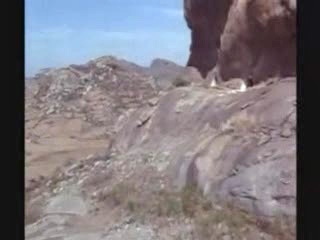
The Marabar Caves at Ramanagaram
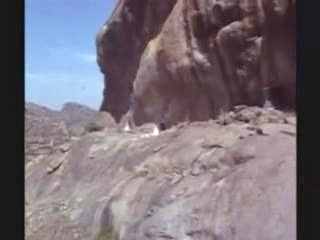
Here Lean created his own caves
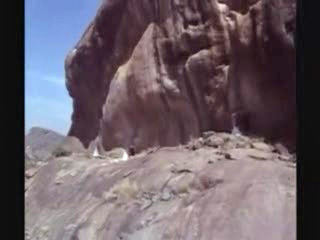
Natural rock, before the camera-matte was added
| [scene: In the Ramanagaram hills] | |
| Mark Tully | The Ramanagaram hills are the setting for the high point in the drama. Lean's blasted holes in these pre-historic rocks to make his own Marabar Caves. The great unanswered question of Forster's novel remains. Did Aziz assault Miss Quested here? One producer offered Lean a limitless budget to make it an explicit rape scene. He hasn't, but no one outside the production knows what he *has* done. |
| Mark Tully | The only other English woman on the picnic at the caves is Mrs Moore, played by Peggy Ashcroft. |
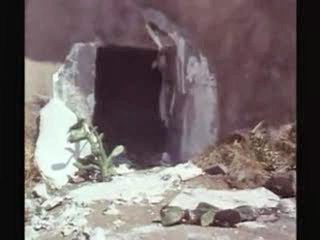
Creating the false cave entrance
| [scene: Interviewing Peggy Ashcroft at Bangalore] | |
| Mark Tully | I have to ask you.. |
| Peggy Ashcroft | Yes |
| Mark Tully | What happened in the cave? |
| Peggy Ashcroft | Oh well, Forster himself didn't know, did he? He wouldn't make up his mind. He wrote several versions. My own view is that of Mrs Moore, that Aziz was totally innocent of any form of assault. |
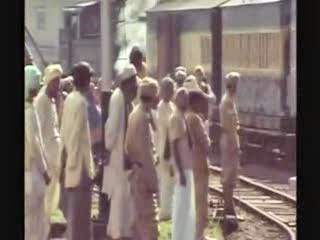
Extras waiting at Coonoor Station, on the NMR
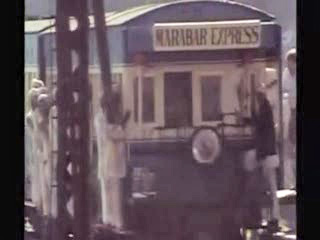
Marabar Express returning to 'Chandrapore'
| [scene: Filming at Coonoor railway station] | |
| Mark Tully | When the train returns home, there's a crowd, waiting to watch the arrest of Aziz. |
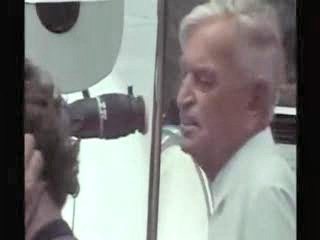
David Lean filming at Coonoor railway station
| [scene: Filming at Coonoor railway station] | |
| David Lean, on location | Don't worry about the back - that bit - leave the back. |
| Mark Tully | The Raj backs Miss Quested, the Indian's Aziz, and Chandrapore is never the same again. |
